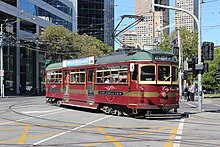City Circle tram
| City Circle (Route 35) | |||||
|---|---|---|---|---|---|
 | |||||
 | |||||
| Overview | |||||
| System | Melbourne tramway network | ||||
| Operator | Yarra Trams | ||||
| Depot | Southbank | ||||
| Vehicle | W class | ||||
| Route | |||||
| Locale | Melbourne, Australia | ||||
| Zone(s) | Free Tram Zone | ||||
| Timetable | City Circle timetable | ||||
| Map | City Circle map | ||||
| |||||
The City Circle is a zero-fare tram running around the central business district of Melbourne, Australia. Aimed mainly at tourists, the route passes many Melbourne attractions while running along the CBD's outermost thoroughfares, as well as the developing Docklands waterfront precinct. It operates in both clockwise and anti-clockwise direction.
History

The tram route was introduced on 29 April 1994,[1] requiring a small track extension along Spring Street, between Collins and Flinders Streets, to enable a complete CBD loop to be formed.[2] The Federal Government's Building Better Cities program funded the $6.4 million capital cost of the track expansion, while the State Government funded the running costs.[3]
Until January 2003 the western leg of the original route of the tram was down Spencer Street, but the route was then extended west to run through Docklands. The travel time around the circle before this change was 40 minutes.[4]
During early 2006, new Passenger Information Displays were installed along with Digital Voice Announcements.
In April 2008, the service adopted the daylight saving timetable on a permanent basis, operating from 10:00 to 21:00 every Thursday, Friday and Saturday. The end of service at other times is 18:00.[5]
On 30 May 2009, the route was altered for a second time, being extended from Harbour Esplanade to the NewQuay and Waterfront City precincts via Docklands Drive. This made the route an elongated 'q'.[6]
Route


The route of the City Circle trams roughly follows the outer edges of the Hoddle Grid, with three diversions. It takes in all of La Trobe Street, Harbour Esplanade and Flinders Street. It follows Spring Street between Flinders and Bourke Streets, but travels along Nicholson Street and Victoria Street before turning into La Trobe Street. At the junction of Harbour Esplanade and Latrobe Street trams turn off the loop to run to and from a terminus towards the end of Docklands Drive, Waterfront City.
Operation
The City Circle route is operated by heritage W class trams liveried in burgundy with gold trim, however rolling stock shortages often see Melbourne & Metropolitan Tramways Board liveried traditional green liveried W Class trams on the service. Trams display the route number 35.[7] The City Circle operates at a headway of 12 minutes in both directions, with the service taking approximately 60 minutes to complete a loop.[8] Ten trams are allocated to the service at any one time (five in each direction). An average of three million passengers uses the service every year, with each tram circling the city 9 times a day, or 12 times when the tram operates to 21:00.[5]
Route map
Route 35 | |||||||||||||||||||||||||||||||||||||||||||||||||||||||||||||||||||||||||||||||||||||||||||||||||||||||||||||||||||||||||||||||||||||||||||||||||||||||||||||||||||||||||||||||||||||||||||||||||||||||||||||||||||||||||||||||||||||||||||||||||||||||||||||||||||||||||||||||||
|---|---|---|---|---|---|---|---|---|---|---|---|---|---|---|---|---|---|---|---|---|---|---|---|---|---|---|---|---|---|---|---|---|---|---|---|---|---|---|---|---|---|---|---|---|---|---|---|---|---|---|---|---|---|---|---|---|---|---|---|---|---|---|---|---|---|---|---|---|---|---|---|---|---|---|---|---|---|---|---|---|---|---|---|---|---|---|---|---|---|---|---|---|---|---|---|---|---|---|---|---|---|---|---|---|---|---|---|---|---|---|---|---|---|---|---|---|---|---|---|---|---|---|---|---|---|---|---|---|---|---|---|---|---|---|---|---|---|---|---|---|---|---|---|---|---|---|---|---|---|---|---|---|---|---|---|---|---|---|---|---|---|---|---|---|---|---|---|---|---|---|---|---|---|---|---|---|---|---|---|---|---|---|---|---|---|---|---|---|---|---|---|---|---|---|---|---|---|---|---|---|---|---|---|---|---|---|---|---|---|---|---|---|---|---|---|---|---|---|---|---|---|---|---|---|---|---|---|---|---|---|---|---|---|---|---|---|---|---|---|---|---|---|---|---|---|---|---|---|---|---|---|---|---|---|---|---|---|---|---|---|---|---|---|---|---|---|---|---|---|---|---|---|---|
| Free Tram Zone covers all stops. | |||||||||||||||||||||||||||||||||||||||||||||||||||||||||||||||||||||||||||||||||||||||||||||||||||||||||||||||||||||||||||||||||||||||||||||||||||||||||||||||||||||||||||||||||||||||||||||||||||||||||||||||||||||||||||||||||||||||||||||||||||||||||||||||||||||||||||||||||
| |||||||||||||||||||||||||||||||||||||||||||||||||||||||||||||||||||||||||||||||||||||||||||||||||||||||||||||||||||||||||||||||||||||||||||||||||||||||||||||||||||||||||||||||||||||||||||||||||||||||||||||||||||||||||||||||||||||||||||||||||||||||||||||||||||||||||||||||||
| #(C) – clockwise stop number; #(A) – anticlockwise stop number. Victoria Parade bus routes: 302, 303, 304, 305, 309, 318, 350, 402, 684, 905, 906, 907, 908 All stops shown. Route map is not to scale. | |||||||||||||||||||||||||||||||||||||||||||||||||||||||||||||||||||||||||||||||||||||||||||||||||||||||||||||||||||||||||||||||||||||||||||||||||||||||||||||||||||||||||||||||||||||||||||||||||||||||||||||||||||||||||||||||||||||||||||||||||||||||||||||||||||||||||||||||||
References
- ^ "Public transport - City Loop history". www.doi.vic.gov.au. Retrieved 6 August 2008.
- ^ Lyndsay Neilson. "Getting implementation going". The Building Better Cities program 1991-96: a nation-building initiative of the Commonwealth Government. epress.anu.edu.au. Retrieved 1 November 2010.
- ^ Lyndsay Neilson. "Appendix 1: Funding Allocation, Victorian Area Strategies". The ‘Building Better Cities’ program 1991-96: a nation-building initiative of the Commonwealth Government. epress.anu.edu.au. Retrieved 1 November 2010.
- ^ "City Circle Tram Extended to Melbourne's Waterfront at Docklands". Minister for Major Projects, Minister for Public Transport. 23 January 2003. Retrieved 6 August 2008.
- ^ a b "City Circle Tram to Run When the Sun goes Down". Premier of Victoria. 6 April 2008. Retrieved 6 August 2008.
- ^ Yarra Trams (1 May 2009). "Media Release: Popular City Circle tram extended to Docklands Drive". www.yarratrams.com.au. Retrieved 28 March 2010.
- ^ "Tram 35 (City Circle)". Metlink. Retrieved 6 August 2008.
- ^ "City Circle (Free Tourist Tram)". Metlink. Retrieved 6 August 2008.
External links
 Media related to City Circle Tram at Wikimedia Commons
Media related to City Circle Tram at Wikimedia Commons- Route 35 map
- Route 35 timetable

